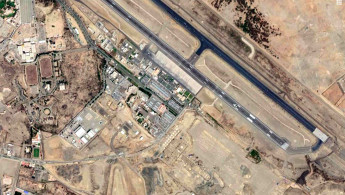Yemen's Houthi rebels claim new missile attack 'halted traffic' at Saudi airport
The Saudi-led coalition said an 'enemy projectile' had 'fallen' on the Abha airport in southwestern Saudi Arabia, close to the kingdom's border with war-torn Yemen.
2 min read
Saudi Arabia has been involved in the war in Yemen since 2015 [Google Maps]
Yemen's Houthi rebels directed a cruise missile towards Saudi Arabia's Abha airport on Wednesday evening, the group said.
The group's spokesman Yahya Saria said the missile targeted plane hangars, causing the halting of "air traffic" at the dual-purpose military and civilian airport in southwestern Saudi Arabia.
The group's spokesman Yahya Saria said the missile targeted plane hangars, causing the halting of "air traffic" at the dual-purpose military and civilian airport in southwestern Saudi Arabia.
The Saudi-led international coalition that has fought the Houthis in Yemen since 2015 confirmed that an "enemy projectile" had been launched towards Abha on Wednesday.
The coalition's spokesman Colonel Turki al-Malki said the cruise missile had "fell" on the airport and caused no casualties.
Earlier on Wednesday, the coalition said it had destroyed a drone launched by the Iran-linked rebels, while on Tuesday it said it downed two Houthi drones.
The past week has seen an uptick in drone and missile attacks claimed by the rebels.
The Houthis on Monday claimed they struck an "important" military target in the Saudi capital Riyadh, after a series of attacks claimed by the rebels over the weekend.
Saudi Arabia said on the weekend it intercepted six missiles fired by the Yemeni rebels at the southern city of Jizan.
The Houthi rebels have stepped up cross-border missile and drone attacks in recent months, saying they are in retaliation for the Saudi-led air war in Yemen.
Saudi Arabia has repeatedly accused Iran of supplying sophisticated weapons to the Houthis, a charge Tehran denies.
The coalition intervened in support of the Yemeni government in 2015 after the Houthis seized the capital Sanaa and closed in on the government's temporary base of Aden.
Since then, the conflict has killed tens of thousands of people, many of them civilians, relief agencies say.
It has triggered what the United Nations describes as the world's worst humanitarian crisis, with much of the country on the brink of famine.





 Follow the Middle East's top stories in English at The New Arab on Google News
Follow the Middle East's top stories in English at The New Arab on Google News
![Israeli forces ordered bombed Gaza's Jabalia, ordering residents to leave [Getty]](/sites/default/files/styles/image_330x185/public/2176418030.jpeg?h=a5f2f23a&itok=_YGZaP1z)

